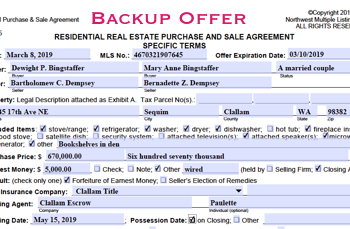So you have a closing date on your Purchase and Sale Agreement, and you’re thinking that is a firm closing date. You’re making a lot of plans around that date. The closing date is scheduled on the calendar, but it is only a target closing date. The world has its own agenda, and so do a lot of other people who can change your plans for you. Knowing this can help you plan your move and help reduce your stress level if you do miss your first or second closing date.
The Closing Date as the Contract Date
The closing date in your real estate contract is a specific date that is intended as a firm closing date, but as a practical matter closings are extended all the time. Buyers, sellers, mortgage brokers, appraisers, underwriters, title companies, and escrow companies all look at the closing date as a target. Under Washington state case law, if a transaction cannot close on the exact closing date through no fault of the buyer, the closing may be extended a reasonable period of time, and the seller is still under contract and obligated to close. (Don’t expect sellers to know this law.) Recently many transactions have been missing the closing date and the closing must be extended one, two, or three times. Why?
The Closing Date – A Moving Target
Recently one of my transactions closed after four closing extension addendums. Not one of the extensions was the fault of the buyer or the seller, nor were any of the extensions the fault of the mortgage broker, nor the title or escrow companies. So who was at fault? Why did this transaction need four extensions to close? Sometimes no one is at fault, and other times it’s impossible to figure out if anyone is at fault.
One of the reasons this closing was extended was that the appraiser took a long time to get to the property and do his appraisal. Then he took a couple more weeks to get his written report submitted to the lender. Two days before the closing date, the underwriter for the lender said the appraisal report indicated the water was not turned on in the house. That didn’t make any sense to the rest of us, because no one shut the water off. The underwriter said he would not fund the loan without the water on, which was ridiculous. After a volley of phone calls between nearly everyone involved in the transaction, and many emails back and forth for two days, we learned the water actually was on. It was the appraiser who who made a mistake in his written report.
Closing Date Extensions
Another extension was needed because of items noted in the home inspection report that needed to be repaired, and that meant entering a whole new phase of negotiations (and paperwork) with the seller. Any repairs require independent bids, repair work, and proof of the repairs, and then the appropriate paperwork must be approved and signed by the buyer and seller, and the underwriter must approve the repairs. All of that can add weeks to a closing date.
Another extension was needed when the lender could not fund the loan on the exact closing date, so we extended by two days, but the lender did not get their package to the escrow company in time for overnight deliveries of the closing documents, so we had to extend again.
When the closing date is a moving target, trying to plan a moving truck can be frustrating to say the least. I recommend working with a very experienced and professional mortgage broker and a good real estate agent who know how to be proactive and who know how to work through complex issues that can and regularly do come up. The truth is, real estate transactions are more difficult today than they have been in the past three decades. I thought you would appreciate knowing all this when you are planning your closing date.
Last Updated on September 20, 2019 by Chuck Marunde































